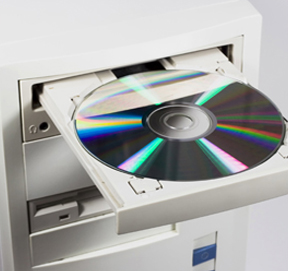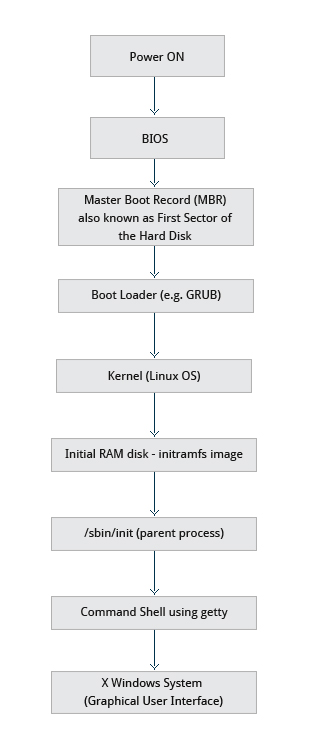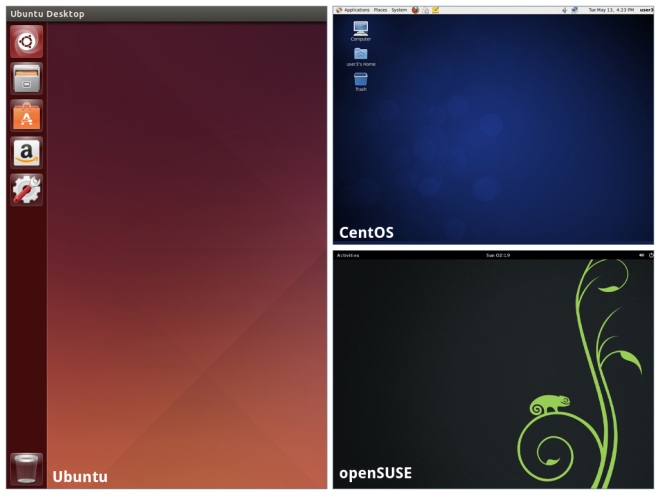What does it matter if you knew about the Linux boot process?
The boot process is the procedure that the system follows when initializing the system from when you press the ON button to that time when it becomes usable.
At a passive point of view, the whole matter might be trivial and unimportant. But thinking about it again will tell you that it is not so at all. After all, if your computer didn’t boot up, you might be in for a whole lot of trouble.
You don’t have to learn it very hard. Nevertheless, a good understanding of the boot process can save you from a lot of headaches when troubleshooting problems. Also, knowing it better will help you tailor-fit your computer to your own needs.
[LFS101.x Chapter 03, Section 2: The Boot Process]
What happens while your Linux system boots up?
Hello, world!
Usually, you say that when something is just starting. It’s also the first thing you learn to print when you’re printing your first line of text in a new programming language. It’s mostly a starting thing.
This post is not the first post, not the second… Well, the point is, I thought that this might be a better place for me to follow Blogging 101 with and so I decided to post the first assignment here instead of in my other blogs.
It’s supposed to be an intro to the blog, the assignment says. But I’ve already done that in Because sysadmin. I’m not gonna do that again. So, I’m just gonna make this my intro post to the Blogging 101 community.
I shouldn’t be saying that but… If you want an intro to this blog, head over to Because sysadmin.
If you’ve got any questions or just wanted to say, “Hi!” or anything, there are plenty comment boxes scattered about. I hope we can have a great blogging month together!
Oh, yeah, I should also be adding a Blogging 101 badge…
When did Linus Torvalds start writing the Linux kernel?
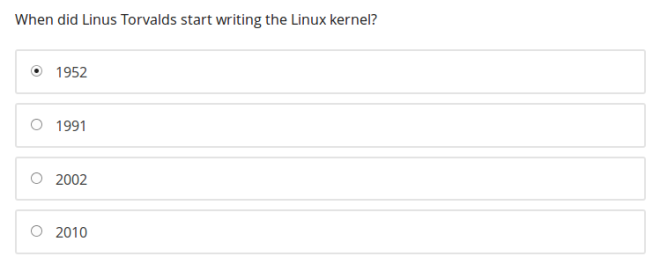
I really, really, really wanted to answer 1952.
Preparing your computer, Step 1: Pick a distro
Learning Linux requires more than just having the learning materials to read Linux from. Like any other things to learn about computers, you learn better if you have the actual tool. In this case, an installation of Linux in a machine.
Now, a distro is but a Linux distribution. At first, it can be quite confusing to pick which distribution of Linux you want to install. There are tons of distros available. Plus, each distro can come with its own flavors.
To make it easier though, the following are the most common distribution families and the most common distros under each family:
- Fedora: Fedora, Red Hat Enterprise Linux (RHEL), CentOS
- Debian: Debian, Ubuntu, Mint
- SUSE: SUSE, OpenSUSE
As you might already know, these aren’t all the distros under these families. There are tons more to each family and there are also others that can’t exactly be put in one. There are also other distribution families. A very complete list can be found here: http://lwn.net/Distributions. Distrowatch is also a good source: http://distrowatch.com/.
Usually, it is the method of software packaging, installation, and updating that unites the members of each family. They also say that Ubuntu or Mint would be easiest for relatively inexperienced users. On the other hand, people with more powerful machines may be more at home with CentOS or OpenSUSE.*
I’m no expert but, in the end, what distribution you pick ultimately depends on which one you feel most comfortable with. At first, this decision will be based on looks and that will be perfectly normal. In my case, my distro of choice is Ubuntu. More specifically, the xde flavored one, Xubuntu.
Pwning Tomorrow: An Anthology of Short Fiction from the Electronic Frontier
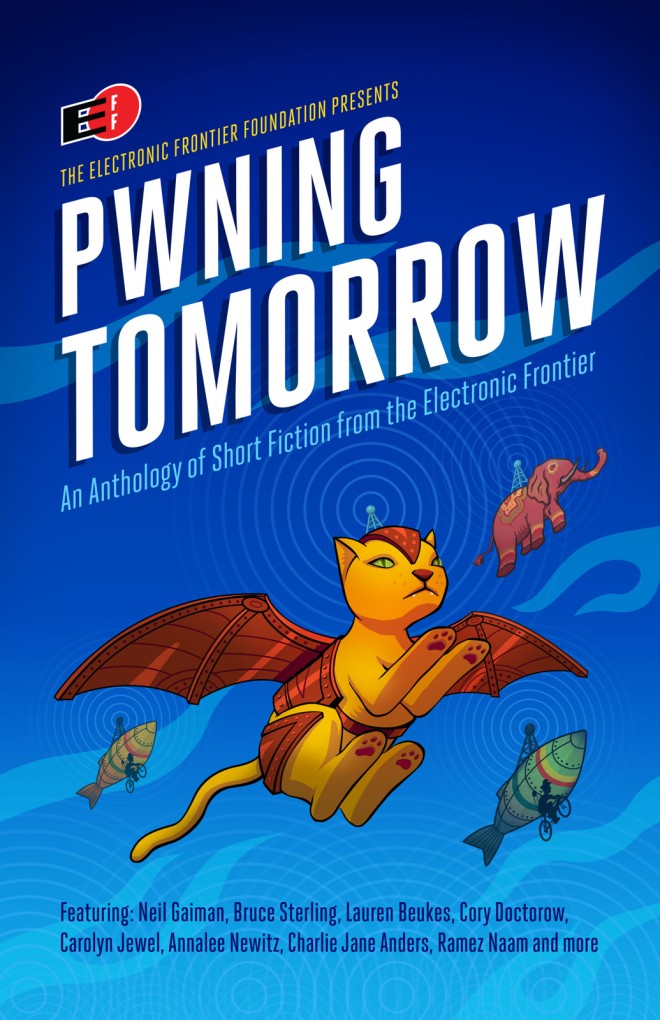 This book, published by the Electronic Frontier Foundation and released on their 25th anniversary, is a collection of short stories from several authors including Neil Gaiman, Bruce Sterling, Cory Doctorow, and tons more. The stories chronicle many different adventures about the future of “technology over the next 25 years and beyond, imagining the consequences of everything from abusive intellectual property lawsuits to out-of-control viral marketing; from over-protective intelligent fridges to violently loyal cyber-pets.” (Maass, 2015)
This book, published by the Electronic Frontier Foundation and released on their 25th anniversary, is a collection of short stories from several authors including Neil Gaiman, Bruce Sterling, Cory Doctorow, and tons more. The stories chronicle many different adventures about the future of “technology over the next 25 years and beyond, imagining the consequences of everything from abusive intellectual property lawsuits to out-of-control viral marketing; from over-protective intelligent fridges to violently loyal cyber-pets.” (Maass, 2015)
You can donate to the EFF and download the book from here: https://supporters.eff.org/donate/pwning-tomorrow. The book is also available for free download.
What are the objectives of the Linux Foundation?
- To promote Linux and provide neutral collaboration and education
- To improve Linux as a technical platform
- To sponsor the work of Linus Torvalds
A Brief Guide to Starting Your Career as a Linux Sysadmin
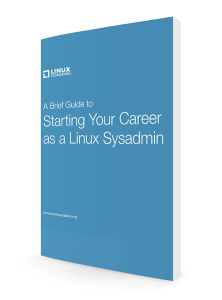 This is an ebook from the Linux Foundation that tells of exactly what the title says. You can download it for free from here: https://training.linuxfoundation.org/sysadmin-it-career-guide.
This is an ebook from the Linux Foundation that tells of exactly what the title says. You can download it for free from here: https://training.linuxfoundation.org/sysadmin-it-career-guide.
Where is this all coming from?
On that note…
While I have been using a Linux machine for a really long while now, I can’t say that I’ve been able to delve deep into it. So, I can use a Linux-based machine and talk to the terminal a small bit.
And that’s basically it.
So, all the new stuff I will be learning will be coming from the free Linux Foundation MOOC LFS101x.2: Introduction to Linux (2nd ed.) hosted by edX which can be found here: https://courses.edx.org/courses/course-v1:LinuxFoundationX+LFS101x.2+1T2015/info.
If you are interested in learning more about Linux, this should be a good place to start.
